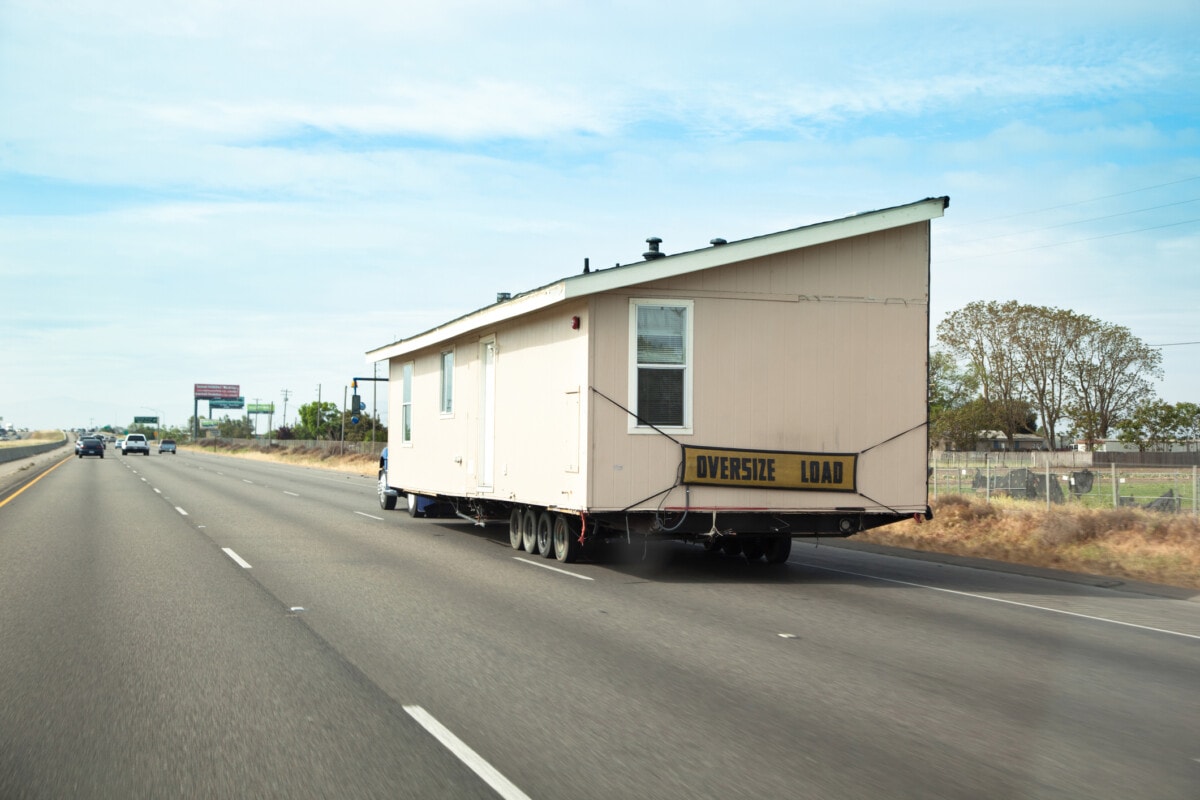Moving a house is a monumental undertaking that involves not only physical logistics but also significant financial considerations. Whether you’re relocating a historic home to preserve its character or simply seeking a change of scenery, the cost of moving a house can be daunting.
In this Redfin article, we’ll look at the costs of moving a house. We’ll explain what factors affect these costs and offer practical insights to assist you in planning your move. So whether you’re interested in moving your home in Grand Rapids, MI, or your mobile home in Birmingham, AL, read on to learn more about how much it costs to move a house.

Is it possible for you to relocate any house?
In theory, it’s possible to move almost any house, but the feasibility and practicality of moving a specific house depend on various factors. Key considerations include the house’s size, condition, and construction, the distance to be moved, and the local regulations governing house moves. Mobile homes, small homes and structurally sound homes are generally easier to move than larger or more fragile structures. Additionally, the route between the current and desired locations plays a critical role, as it must accommodate the size and weight of the house and may require the temporary removal of obstacles like utility lines or trees. House-moving professionals assess these factors and determine whether a home can be moved safely and cost-effectively. While many houses can be moved, it’s a complex endeavor that requires careful evaluation and planning.
Get pre-approved and secure your dream home
Work with a lender to find the right loan for the home you love.
How do you move a house?
Get pre-approved and secure your dream home
Moving a house is a complex and intricate process that involves several key steps. Firstly, the house is typically lifted off its foundation using hydraulic jacks and steel beams. Then, a system of wheels or hydraulic dollies is used to transport the house to its new location, which may be nearby or miles away. Proper permits and route planning are essential for a smooth and safe journey. Once the house reaches its destination, it’s placed onto its new foundation, and any necessary connections to utilities and services are re-established.
The process demands the expertise of specialized house-moving companies, structural engineers, and coordination with local authorities to meet safety and regulatory standards.
How much does it cost to move a house?
The cost of moving a house can vary significantly depending on several factors. The primary determinants include the size and weight of the house, the distance it needs to be moved, the complexity of the route, and any additional services required, such as disconnecting and reconnecting utilities or making structural modifications. As a rough estimate, moving a small to moderately-sized house locally might cost anywhere between $15,000 to $40,000.
Long-distance or larger homes can cost substantially more like $200,000. Obtaining quotes from reputable house-moving companies who can assess your situation and provide a more accurate estimate is essential.

Nine factors to consider when moving a house
Relocating your residence is a significant undertaking; here are nine crucial factors to contemplate before making the big move.
1. Budget and cost
Relocating a house, whether near or to a distant locale, comes with several financial considerations. Among the most significant are the fees of moving companies, which fluctuate based on the distance of the move, the volume of items, and any additional services like packing or furniture assembly. Also, if there’s a delay in settling into your new home, you might incur costs for temporary accommodations, be it through hotel stays or short-term rentals. It’s equally vital to budget for unexpected expenses, such as emergency repairs or last-minute packing supplies.
To navigate these financial intricacies smoothly, it’s prudent to prepare a comprehensive budget. Detailing expected costs, from mover fees to potential storage unit charges, provides clarity. Additionally, setting aside a contingency fund, roughly 10-20% of the anticipated moving costs, ensures you’re equipped to handle unforeseen expenditures, providing peace of mind during the transition.
2. House size and condition
Physically relocating a house is no small task, and the structure’s size and condition stand as primary determinants in this endeavor. The dimensions of the house influence the complexity of the move and dictate the kind of equipment and manpower required. A larger home, due to its sheer volume, often necessitates specialized machinery and a seasoned team. Moreover, the condition of the house is paramount. Older structures or those in disrepair may present unique challenges, requiring reinforcements or preparatory work to ensure safe transport. Issues like foundational stability, age-related wear, or structural weaknesses need thorough assessments to guarantee a successful move.
3. Distance and route
When moving a house, the distance plays a paramount role in shaping the endeavor. For longer trips, moving a house gets trickier. You have to plan the route carefully and look for potential obstacles, road conditions, and the presence of utility lines or infrastructure that may require temporary removal or adjustments. Additionally, the cost escalates with the mileage due to factors like fuel consumption, equipment wear, and potential overnight stays. Moving across different regions can also introduce a maze of permits and regulations, each with distinct requirements and associated fees.
4. Permits and regulations
Permits and regulations play a vital role in moving a house. Local building codes, zoning regulations, and permits are essential considerations to ensure compliance with legal requirements. Failing to obtain the necessary permits or adhere to regulations can lead to delays, fines, or legal complications during the house move, making it crucial to address these aspects diligently.

5. Insurance
Adequate insurance coverage protects you against potential damages or losses that may occur during the move, ensuring that you are financially secure in case of unexpected events. It’s essential to review your insurance policies and, if necessary, purchase additional coverage specific to the house move to mitigate risks and provide peace of mind.
6. Foundation
Checking the foundation is crucial before relocating a house. It’s vital to make sure it can hold up the house’s weight and structure without any issues. If there are any problems with the foundation, you’ll need to plan for repairs or adjustments. Doing this work before the move ensures the house sits securely in its new location. Proper preparation avoids immediate structural problems and helps maintain the building’s strength and safety for years to come.
7. Weather
Weather conditions are an essential consideration when moving a house. Adverse weather, such as heavy rain, strong winds, or extreme temperatures, can impact the safety and feasibility of the move. Planning the action during a season or time of year when favorable weather conditions are reasonable is essential.
8. Professional expertise
Engaging experienced house-moving professionals who are skilled in the complexities of relocating structures is essential. These experts can assess the specific challenges of your move, provide expert guidance, and execute the process safely and efficiently. Their knowledge ensures that all aspects of the move, from structural integrity to logistics and safety, are appropriately managed, reducing risks and increasing the likelihood of a successful and smooth house relocation.
9. Contingency plans
Despite meticulous planning, unexpected issues such as equipment malfunctions, weather disruptions, or route obstacles can arise during the move. Having backup plans ensures that you can respond effectively to these challenges, minimizing potential delays and ensuring the safety of everyone involved.

What are the risks of moving a house?
Moving a house entails various risks and challenges. Structural damage to the house is a significant concern, as lifting and transporting can lead to cracks, shifts, or other forms of structural compromise if not executed meticulously. During the lifting and relocation process, there’s also the potential for damage to utility lines, including gas, water, and electricity, posing safety risks and potential disruptions. The logistical challenges are considerable, involving coordination with local authorities, permits, and sometimes the temporary removal of obstacles like trees or utility poles, which can create risks for the surrounding community.
How to budget for your move
Budgeting is a comprehensive process that requires thorough planning. Begin by creating a detailed list of all potential expenses, such as hiring professional movers, packing materials, transportation, insurance, utility disconnection, reconnection fees, and any temporary housing or storage costs. Prioritize these expenses based on their importance and urgency. Next, establish a budget by determining how much you can allocate to each category within your total moving budget. Remember to account for unforeseen expenses by setting aside a contingency fund. Throughout the process, use spreadsheets for budgeting tools to track your spending and compare it to your budget regularly to ensure you’re staying on track.
A final note on moving a house
Relocating an entire house is no small feat. It requires meticulous planning, a deep understanding of the structure’s needs, and a dedication to ensuring its safe transition. Whether you’re motivated by preservation, practicality, or sheer love for the structure, the endeavor is a testament to the lengths we’ll go to make a space our own. Always prioritize safety, and remember that with the right preparation and expertise, even houses can find a new place to call home.



























 United States
United States Canada
Canada